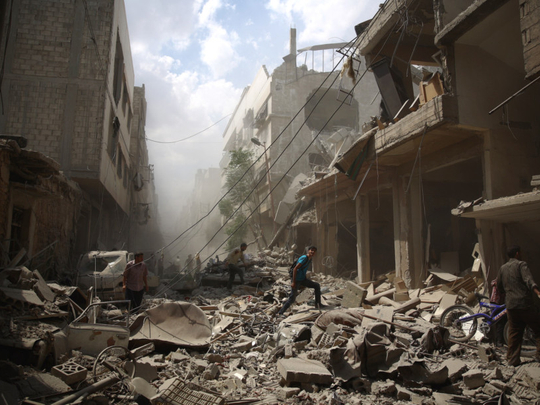
Over the weekend, diplomats gathered in Geneva with representatives of the Syrian government and some of its opponents. On Monday, the first votes of America’s presidential election nomination process were cast in the state of Iowa.
A year from now, America will have a new president. At that time Syria, in all likelihood, will still be mired in civil war. There is no reason to believe that the next American president, whomever he or she is, will have anything really substantive to offer in terms of breaking the Middle East’s bloodiest stalemate.
Let’s be clear from the outset: At its core, this is a Syrian problem. Foreigners of many stripes are meddling in Syria, but that is not the reason why the country is at war. That does not mean that the international community has no role to play, but it does mean that any eventual solution to this crisis needs to be reached by and among Syrians themselves. Outsiders can help (or hinder) but they cannot make the deal, let alone impose it on a chaotic failed state.
If foreigners are to be of any help they have to focus on the problems that actually exist rather than projecting their own fears and fantasies onto the situation in Syria.
One can argue that the process the UN is pushing forward in Geneva is flawed: If proximity talks are the best you can manage, that implies that the warring parties are not really ready to make peace in the first place (not, at least, on terms their opponents are ever likely to accept). Even more importantly, if all sides are not fully represented — because someone excluded them or because they refused to turn up — how can any agreement really be expected to hold?
So far, so pessimistic. Beyond that, however, there is a glaringly obvious problem with these talks: The priorities and agendas of the foreign participants bear little relation to the situation on the ground. Simply put, the Syrians are concerned with remaking Syria. The foreigners urging them to the table and purporting to help them talk are concerned mainly with eliminating Daesh (the self-proclaimed Islamic State of Iraq and the Levant) and stopping the flow of refugees headed for Europe.
Perhaps the clearest sign of this came during last week’s Republican debate when New Jersey Governor Chris Christie was asked about same-sex marriage and, in response, vowed to destroy Daesh (for the record, I realise this sounds absurd but I am not making it up. Google the transcript of the 28 January debate and check it out for yourself).
“I will take on [Daesh], not only because it keeps us safe, but because it allows us to absolutely conduct our religious affairs the way we find in our heart and in our souls,” Christie said.
This is comically disconnected from what is actually happening. Indeed, one had no sense during last week’s debate that any of the candidates actually has a plan to deal with Syria. The only discussion of refugees was about whether almost-all or absolutely-all of them should be barred from America. All the candidates struggled to outdo one another in threatening military action.
Forceful advocate
The Democratic Party side of this debate is only marginally better. Senator Bernie Sanders, whose long career in Congress has never focused on foreign policy, is studiedly vague — offering little beyond a call for Washington to work more closely with its Arab allies and Turkey. Hillary Clinton has long been a forceful advocate of a no-fly zone over Syria, but it is debatable how much impact that could really have at this stage of the conflict.
The paradox hanging over all these debates is clear, though rarely spoken aloud: everyone agrees that something urgently needs to be done to stop the collapse of Syria (and, in the process, to confront the issues of refugees and Daesh). No one, however, is actually willing to do anything substantive because no outside power is eager to get involved in another Middle Eastern war.
The diplomats will continue to talk in Geneva, Vienna and other comfortable European locations. Meanwhile politicians will continue to campaign across America and, as 2016 goes on, in a slew of European countries at the local and regional level, all of them promising ever-more safety and security in the face of growing threats.
In America especially, those promises ring hollow. Some politicians — the more naive ones — may actually think they can bomb Daesh out of existence at a fairly minimal (to America) cost, and that doing so will somehow ‘contain’ the Syrian conflict. Any competent strategist will tell you it does not really work that way.
Elections, of course, are rarely (if ever) about nuances. But is it too much to ask candidates for the American presidency to address the interlocked crises of Syria and Daesh with some combination of intelligence, compassion and realism? The region’s future may ultimately depend on this, and, with it, the real (as opposed to notional) safety and security of the United States.
Gordon Robison, a longtime Middle East journalist and US political analyst, teaches Political Science at the University of Vermont.










